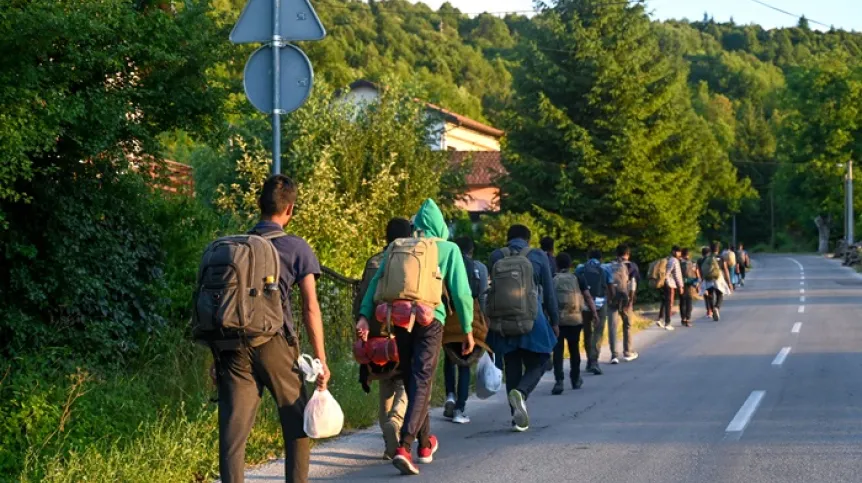
The growing debate over illegal migration in Poland is becoming increasingly polarised, with sociologists warning against moral panic, vigilantism, and misinformation. According to Professor Krzysztof Podemski from Adam Mickiewicz University in Poznań, while migration brings both opportunities and challenges, the scale of those challenges is being misrepresented in the public debate.
"Migration can mean both opportunities and challenges. However, the scale of these challenges that we face in Poland is rather exaggerated," Podemski told the Polish Press Agency (PAP).
His comments come amid a wave of anti-immigration protests across Poland. Demonstrations in mid-July drew thousands, and another mass march is planned for October 11 by the ruling Law and Justice party (PiS), which has called on "all patriotic forces" to join.
Migration, particularly illegal migration, has re-emerged as a central political issue in Poland, fueling protests and intensifying public anxiety. This anxiety is now affecting not only recent arrivals but also long-time residents of foreign descent, including Polish citizens.
According to Podemski, migrants make up a relatively small portion of the population — around 6 to 7 percent — and fears of large-scale societal disruption are not supported by data.
"Nevertheless, on the one hand migrants enrich social and cultural life in Poland in many areas, and on the other — they often save the labour market. The contribution of Ukrainians, the largest group of immigrants in Poland, in such industries as care and hotel industry, is priceless," he said.
Podemski warns that right-wing political actors are amplifying fears by comparing Poland’s situation to Western Europe.
"Still, right-wing political forces in Poland often project the situation we know from Western Europe, playing into human fears. In sociology it is called sowing moral panic," he said. "They present Poland as a 'security island', and at the same time they spread the myth of ethnic crime plague, which is not confirmed by the statistics of the Ministry of Interior and Administration."
According to Ministry data, the number of serious crimes involving foreign suspects is falling. In 2023, there were 565 murders with 40 foreign suspects; in 2024, 503 murders and 32 foreign suspects; and in 2025 so far, 272 murders and 13 foreign suspects.
Conversely, hate crimes have seen a slight increase. Police data show that 761 racially, ethnically, or religiously motivated crimes were reported in 2024, while 469 such crimes were recorded in the first half of 2025.
Podemski also criticised the growing presence of so-called "patrols" and “militias”, citizen groups who claim to protect communities from migrants.
"They scare us with illegal migrants, but hardly anyone mentions that the actions of the so-called 'patrols' and 'militias' that arbitrarily +protect+ the streets and crossings are also illegal," he said.
He warned that such vigilantism undermines public trust in state institutions and escalates societal tensions.
According to Podemski, the deterioration in public sentiment toward migrants could have long-term economic consequences. If Poland becomes seen as unwelcoming, it could deter future migrants who are essential for economic growth.
Representatives of the Roma and Vietnamese communities have already raised concerns about growing xenophobia and appealed to Prime Minister Donald Tusk for strong condemnation of discrimination and racism.
Before the July protests, the Ukrainian Ombudsman’s office in Poland issued a warning to Ukrainian nationals to avoid mass gatherings. Similar advisories were sent out by the U.S. and Japanese embassies.
Natalia, a Ukrainian scholar who has lived in Poland for six years, told PAP that public attitudes have shifted dramatically.
"From restraint, then enthusiastic solidarity, unfortunately to extremely negative reactions. I now prefer not to speak Ukrainian in public transport or write pro-Ukrainian comments on social media. Not because I'm afraid, but to protect my emotional forces," she said.
Despite this shift, Ukrainian migrants have significantly contributed to Poland's economy. A Deloitte study commissioned by the UNHCR found that Ukrainian refugees added 2.7 percent to Poland’s GDP in 2024. The employment rate among war refugees stands at 69 percent - only slightly lower than that of Polish citizens, at 75 percent.
But the narrative of their economic value is often drowned out by rising hostility.
"Unfortunately, I experienced how stereotypes work and how all Ukrainians were painted with the same brush," Natalia said. "Sometimes it seems that, for example, the attitude of the owner of the apartment I rent changes not because of our conversations, but due to a change in messages about Ukrainians on television or deterioration of relations between states."
Wiktoria, another Ukrainian migrant who arrived after the 2022 invasion, also reported increasing hostility.
"During one situation on public transport, hateful comments were addressed to young boys (Ukrainians – PAP), which would still be only half bad. Once, however, I witnessed a man and a woman insulting a mother with children," she said.
"Fortunately, xenophobia on the Internet does not yet reflect the actual perception of Ukrainians. Many people have Polish friends or partners. However, I see that the situation is getting worse from day to day.
“I am convinced that without migrants, many companies would simply fall, which would cause a decrease in demand and jobs. So I do not think that Poland without migrants would look attractive," she added.
Ihor Usatenko (PAP)
iua/ malk/ js/ aszw/













